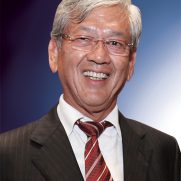Introducing Edwin Soeryadjaya: member of the INS Indonesia Board
Edwin Soeryadjaya (born 17 July 1949) also known as Tjia Han Pun, is a Chinese Indonesian businessman. He is the second son of William Soeryadjaya, the founder of Astra, one of the largest and most reputable conglomerates in Indonesia.
Edwin joined Astra in 1978. During his tenure, he spearheaded the restructuring of Astra’s financial structure and took the company public in February 1990, at that time the largest IPO in Indonesia.
In 1993, Edwin left Astra and set up his own investment company Saratoga Investama Sedaya in 1998. Today, through his private equity firm Saratoga Capital, he is large shareholder in coal miner Adaro Energy. He also has a stake in cell tower company Tower Bersama Infrastructure and bought Mandala Airlines in 2011 with his partner Sandiaga Uno.
Education:
Edwin obtained his Bachelor of Business Administration from USC (University of Southern California) in 1974.
Current involvements:
- PT Saratoga Investama Sedaya Tbk
- Saratoga Capital
- PT Adaro Energy Tbk (coal mine)
- PT Sapta Indra Sejati (mining contractor)
- PT Indonesia Bulk Terminal (coal terminal)
- PT Pulau Seroja Jaya (dry bulk barging)
- PT Mitra Global Telekomunikasi Indonesia (telecom operator)
- PT Makmur Sejahtera Wisesa (power plant)
Interview in The Jakarta Post, January 6, 2014: Fishing for deals with instincts and hard work: Edwin Soeryadjaya
The riches of nature have provided a fortune for the man who Forbes ranked as the country’s 12th richest. With its abundant natural resources, Edwin said, Indonesia had a comparative advantage.
‘Adaro Energy has been our greatest success’. After Saratoga purchased a 51 percent stake in the company, Adaro Energy has thrived, becoming the second-largest coal miner in the country. During its initial public offering (IPO) in 2008, the miner broke records by raising $1.3 billion. The shares were reportedly over subscribed by five times. Edwin credited the takeover of Adaro Energy to his strong networks, especially those linked to Astra International (ASII). Adaro is the longstanding contractor of PT Pamapersada Nusantara (PAMA), a coal miner and a unit under PT United Tractors (UNTR), which itself is a subsidiary of Astra International.
Edwin, being the second son of Astra founder William Soeryadjaya, had served in Astra as vice president from 1978 to 1993. He added that when he ‘heard from the market’ that Adaro was facing difficulties, he moved to ‘dig up more information on what the issues of Adaro were’. ‘I asked people, left and right, who happen to be my friends, and what I learned was that Adaro was supposed to be healthy. Although information itself is valuable, it is what you do with that information that counts. Having information but not knowing what to do with it is pointless.
However, Edwin conceded that investing was not always rosy. Saratoga’s earliest investment in PT Astra Microtonics was lackluster. ‘We bought it for approximately $100 million, and we have exited as well. But I would rather not talk about the value we received at exit’ he said with a chuckle.
Yet, Edwin noted that a memorable investment for him was PT AriaWest International (AWI). ‘AriaWest was my first experience in investing outside of companies I knew through Astra’ he said. In the mid-1990s, AriaWest won government tenders to develop telecommunication fixed lines in West Java and Banten. The firm was jointly owned by Edwin’s PT Aria Infotek, Asian Infrastructure Fund and MediaOne, a unit of US telecom giant AT&T. ‘Winning government tenders through AriaWest gave me the confidence that I could work to build things’ he said. In 2003, state-owned PT Telekomunikasi Indonesia (TLKM) announced it would pay $58.67 million in cash and $109.1 million in promissory notes to purchase AriaWest.
Saratoga remains active in telecommunications. The firm, through PT Saratoga Infrastruktur, has a 10 percent stake in tower operator PT Tower Bersama Infrastructure (TBIG). Edwin added that moving forward Saratoga still saw ‘many possibilities in natural resources’ and would continue investing in the sector with the approximately $600 million it raised in its latest investment round, Saratoga Asia III. Edwin’s interest in natural resources business extended to minerals and plantations. Derivatives from which, such as palm oil, acting as a source of renewable energy. ‘Power plants are an infrastructure backbone that I want to be seriously involved in’ he said. ‘This is because the country is rapidly developing and has high demand for electricity.’ He added that Indonesia was ‘rich in geothermal for us to develop’.
Saratoga, via subsidiary PT Saratoga Power, acquired 51 percent of PT Medco Power Indonesia, a subsidiary of PT Medco Energi Internasional (MEDC), in 2011. The firm is equally interested in the consumer sector, which has been on the rise as the country’s population continues to rise and accrue more wealth. ‘I have been running after companies in the food sector because people will always need food, just like electricity’. ‘I have been approaching four to five companies. And I have been chasing down livestock farms because they are related to basic foodstuffs’ he said.
Whatever the investment, business at the end of the day essentially revolves around providing the returns promised to investors. ‘We know our responsibilities to our investors, and one of our challenges has always been preventing foreign investors from thinking that Indonesia is not a good place to invest’.
Consulting firm Bain & Company partner and Asia-Pacific head of private equity, Suvir Varma, said that in the last four years, investors have increasingly shopped for companies in the consumer sector to complete their portfolio. The consumer sector becomes a natural choice given the country’s growing middle class
‘You can only do so many commodity deals. Once you have your mining deal, you start to look at what other sectors you can get into’, according to Suvir Varma. ‘And its not just purely the consumer sector, but also any derivative industry that benefits from consumer spending’.
Domestic private equities, which were scaling up funds and skills to invest those funds, had their own competitive edge compared to foreign equities. ‘Those funds are managed by Indonesians who have local contacts and networks and so can potentially get proprietary access to quality deals’ Varma said, adding that their ‘ability to understand the local framework was superior’ to that of foreign funds. ‘So anything that requires heavy regulator oversight and is very government policy dependent is likely to be done by the local funds.’
However, according to Edwin, there is more to investing than sticking to the investment rule-book. ‘You have to have what are called instincts. And when things go bad, you have to be brave enough to acknowledge that this is as good as it gets and leave before suffering greater losses. At the end of the day, attaining one’s aims is all about hard work. We ourselves must have the will to work hard because we cannot waste our breath by just complaining’ said Edwin, who was staying at the office into the evening to finish the day’s work. ‘I do not have a fixed time to return home. But if I do not have any more meetings, I head home immediately’ especially if the boss has called asking me to return.’




